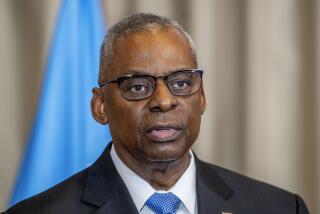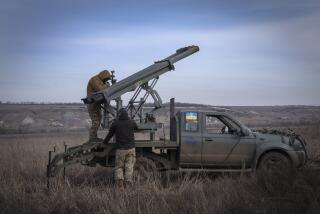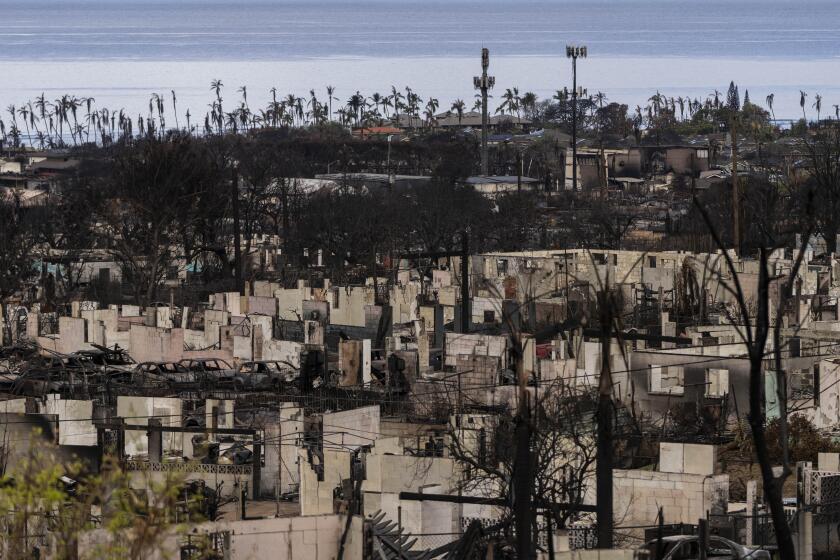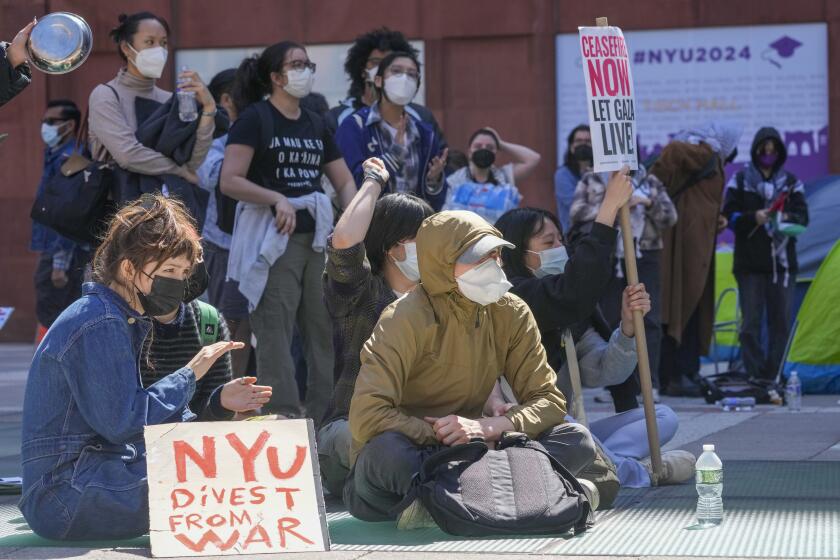Bush Acts to Defuse Furor on Armor
WASHINGTON — President Bush and top military commanders scrambled Thursday to contain the political damage from Defense Secretary Donald H. Rumsfeld’s contentious meeting with U.S. soldiers bound for combat in Iraq, reassuring troops that the Pentagon was working hard to provide them with more safety equipment.
A day earlier, soldiers confronted Rumsfeld, complaining at their makeshift camp in Kuwait that they lacked proper armor.
In Kuwait, Lt. Gen. R. Steven Whitcomb said that new efforts to increase the number of vehicles with armor protection was “a good news story for the Army.”
Whitcomb made his comments in a video teleconference with reporters at the Pentagon. In the background, soldiers outfitted a Humvee with armor plating.
More than 6,500 miles away in Washington, Bush said that the “concerns expressed [by the soldiers] are being addressed, and that is, we expect our troops to have the best possible equipment.”
The confrontation between Rumsfeld and the troops in Kuwait has highlighted how the U.S. failure to anticipate the Iraqi insurgency has kept the Bush administration on the defensive.
On Thursday, Rumsfeld called a tense exchange with Spc. Thomas Wilson of the Tennessee National Guard “very constructive.”
Wilson had told Rumsfeld that troops in Kuwait were forced to rummage through landfills for scrap metal to jury-rig armor for their vehicles before their upcoming journey into Iraq.
“I don’t know what the facts are, but somebody’s certainly going to sit down with him [Wilson] and find out what he knows that they may not know, and make sure he knows what they know that he may not know, and that’s a good thing,” Rumsfeld told reporters Thursday in New Delhi, where he was visiting.
The town hall meeting became a political issue, with many Democrats in Congress describing Rumsfeld’s answers to some of the soldiers’ concerns as “callous.”
About the shortage of armor-protected vehicles in Iraq, Rumsfeld told the troops: “It’s essentially a matter of physics. It isn’t a matter of money. It isn’t a matter on the part of the Army of desire. It’s a matter of production and capability of doing it.”
He added: “As you know, you go to war with the army you have. They’re not the army you might want or wish to have at a later time.”
In the teleconference from Kuwait, Whitcomb said that the Army was fast approaching its goal of outfitting every vehicle in Iraq with some degree of armored protection.
During the months after the U.S.-led invasion of Iraq in March 2003, Whitcomb said, war planners saw little military need for sending armored Humvees into Iraq. Military plants in the United States were producing only 30 armored Humvees a month in August of that year, he said.
But as insurgents in Iraq switched to roadside bombs as their weapon of choice, commanders asked that factories increase their production of armored Humvees.
The U.S. has approximately 6,000 factory manufactured armored Humvees in Iraq, Whitcomb said. Commanders say that at least an additional 2,000 are needed. Whitcomb said that 10,000 more vehicles were equipped with “level 2” armor, a kit of armored plates that bolt on to “soft-skinned” vehicles. The plates are less effective because they offer no protection for the top and bottom of the vehicle.
An additional 4,500 vehicles have what Whitcomb called “level 3” armor, a “stopgap” measure of welded steel plates attached to the sides of trucks and Humvees.
Of the 30,000 wheeled vehicles U.S. troops are operating throughout the Middle East and Central Asia, Whitcomb said, approximately 8,000 lack armored protection.
Marine Brig. Gen. Richard Kramlich, commander of the 1st Force Service Support Group in Iraq, said no Marine convoy was permitted to travel without adequate armor.
On Thursday, it was learned that a Tennessee reporter posted with Spc. Wilson’s unit may have helped craft the question the soldier posed to Rumsfeld. Chattanooga Times Free Press reporter Edward Lee Pitts wrote about his role in an e-mail to colleagues posted on a popular website that tracks news in the media industry.
“Beforehand, we worked on questions to ask Rumsfeld about the appalling lack of armor their vehicles going into combat have,” Pitts wrote. “While waiting for the VIP [Rumsfeld], I went and found the [sergeant] in charge of the microphone and made sure he knew to get my guys out of the crowd.”
The revelation of the reporter’s involvement provoked a sharp retort from the Pentagon.
“Town hall meetings are intended for soldiers to have dialogue with the secretary of Defense,” Pentagon spokesman Lawrence Di Rita said. “It would be unfortunate to discover that anyone might have interfered with that opportunity, whatever the intention.”
Di Rita did not say whether action would be taken against the reporter, such as canceling his permission to be embedded with the Guard unit headed for Iraq.
Some congressional Democrats called for Rumsfeld’s removal.
“Secretary Rumsfeld has still not done what is necessary — which is his highest duty — to protect our troops to the greatest degree possible,” House Minority Leader Nancy Pelosi (D-San Francisco) said on Capitol Hill. “No CEO in America would retain a manager with so clear a record of failure, and neither should President Bush.”
The complaints from soldiers also put Bush in an uncomfortable situation after he spent much of the presidential campaign touting his commitment to U.S. troops in war zones.
During the campaign, he portrayed his rival, Sen. John F. Kerry (D-Mass.), as less than supportive of U.S. soldiers and unrelentingly criticized Kerry’s vote against an $87-billion supplemental appropriations bill to fund combat operations in Iraq.
“When America puts our troops in harm’s way, I believe they deserve the best training, the best equipment and the whole-hearted support of our government,” Bush said during an Oct. 1 rally in Allentown, Pa.
Bush in comments Thursday defended the right of soldiers to ask tough questions of the secretary of Defense.
“If I were a soldier overseas wanting to defend my country, I’d want to ask the secretary of Defense the same question, and that is: ‘Are we getting the best we can get us?’ ” Bush said. “And they deserve the best.”
*
Times staff writers Edwin Chen in Washington and Tony Perry in San Diego contributed to this report.
More to Read
Start your day right
Sign up for Essential California for news, features and recommendations from the L.A. Times and beyond in your inbox six days a week.
You may occasionally receive promotional content from the Los Angeles Times.






